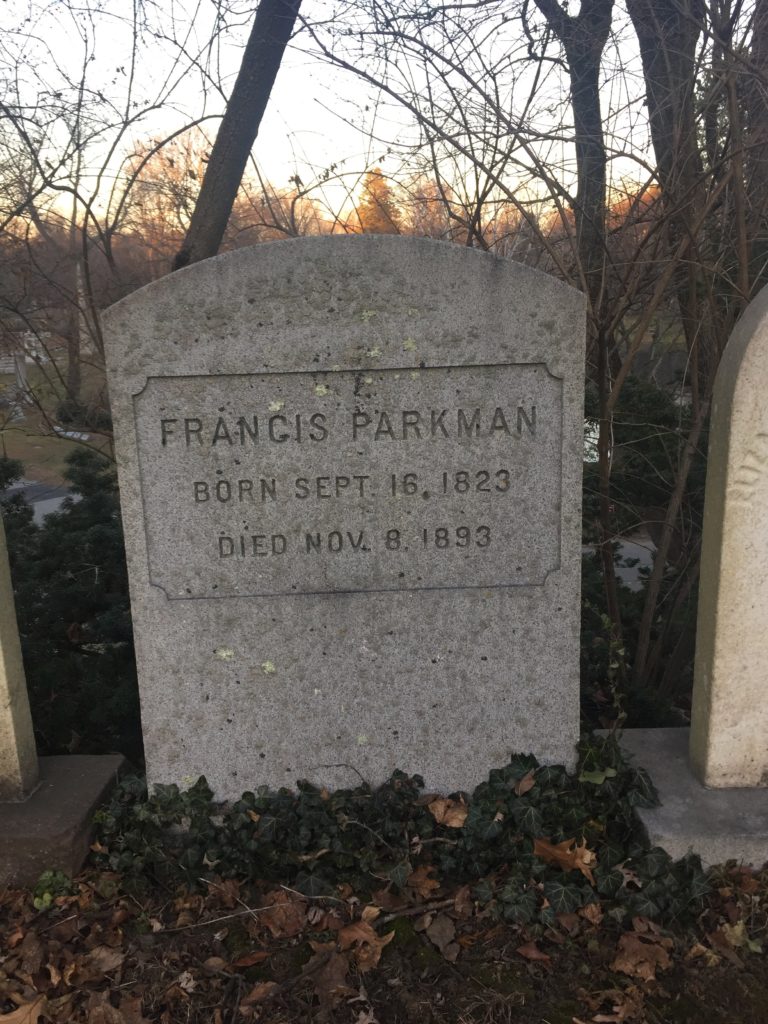Erik Visits an American Grave, Part 588
This is the grave of Francis Parkman.

Born in Boston in 1823, Parkman grew up in the region’s elite. His father was one of the city’s leading Unitarian ministers. He was a sickly boy and spent a lot of time at his grandfather’s heavily forested farm west of the city, which instilled a love of the forests in him. He became one of a species that would later find its apotheosis in Theodore Roosevelt: the eastern elite who loves to play at westerner and frontiersman. Parkman went to Harvard, took some time of for his Grand Tour of Europe, and then went back to school and gradated in 1844.
Parkman’s love of the American frontier led him to an unusual profession for a man of his station: historian of what was becoming the West. His parents were extremely unhappy at this and forced him to get a law degree in order to dissuade him from this non-career. He got the degree but did not change his mind. It was as much the topic as being a historian. It’s not as if there were not historians in the 19th century and they almost always came from the same elite classes as Parkman. It was the subject. “Real” historians studied Europe, especially very old Europe. Did the U.S. even have a history? And that was especially true of the frontier. Parkman very believed it did and that the frontier was a critical part of the American story.
In 1846, Parkman decided to move to the West. He even lived with one of the “Sioux” tribes for awhile (I’m not sure which one and no one uses that term today but that’s how it is usually identified in discussions of Parkman). This did not teach him any respect for Native cultures. He came out of it rejecting the liberal belief that the tribes deserved any respect, such as the people such as Jeremiah Evarts or John Quincy Adams who had opposed Cherokee removal, even if they were paternalists themselves. For him, conquest was progress. Native peoples were savages who needed to be replaced by civilization. And this became the subjects of his books, starting with his 1847 book, The Oregon Trail, which was his book about his time in the West. He followed that with a two-volume history of Pontiac and the Indian Wars that followed the French and Indian War. This era became his specialty, with his seven-volume history France and England in North America, published between 1865 and 1892, of which the most famous volumes are probably 1867’s The Jesuits in North America in the Seventeenth Century and 1884’s Montcalm and Wolfe. Parkman’s stories of the violent conquest of the continent by English settlers were very appealing to the generation following him, when scientific racism backed by violence became in vogue. Thus, Theodore Roosevelt, whose vision of American greatness was based directly in violent conquest of brown peoples around the world, dedicated his own four-volume The Winning of the West series to Parkman.
Today, of course, Parkman is basically unreadable. Historians have repeatedly noted how his overwhelmingly dominant racism clouded his judgment in his historical conclusions and reading of sources. He was also strongly anti-Catholic, leading many French language scholars to dismiss him entirely as a xenophobic crank. But some see it as a valuable, if flawed, form of early American literature, which probably is fair, given its big storytelling and its creation of American myths that were not so seemingly unchangeable when Parkman wrote about them as they became later.
Parkman became one of the nation’s elite intellectuals based around his writing. At the end of the Civil War, he was part of a small group of northerners who aggressively started collection Confederate documents for the Boston Athenaeum, which today remains one of the largest libraries of treason in defense of slavery material in the nation.
All of this was done in the face of real physical difficulties. Parkman had some sort of condition that came and went which nearly totally debilitated him. It meant that at times he could not walk. This would also cost him most of his sight, off and on. This meant often wrote through a process of people reading documents to him and then he would say back what he wanted in the book or whatever else he was writing. This is all quite remarkable, as I would probably just curl up into a ball with such a condition.
Still, Parkman lived an elite life with a lot of money. He built a huge home in Boston, interacted with Brahmin society, raised his two daughters after his wife died (no doubt with a lot of help), and got them married into elite Gilded Age families. He died in 1893, aged 70.
Francis Parkman is buried in Mount Auburn Cemetery, Cambridge, Massachusetts.
If you would like this series to visit other historians, you can donate to cover the required expenses here. The Society of American Historians created the Francis Parkman Prize in 1955 to honor what it considered the best book in American history. Elting Morison, who won in 1961 for Turmoil and Tradition: A Study of the Life and Times of Henry L. Stimson is buried in Peterborough, New Hampshire and William Goetzmann, who won in 1967 for Exploration and Empire: The Explorer and the Scientist in the Winning of the American West, is in New Haven, Connecticut. Previous posts in this series are archived here.


